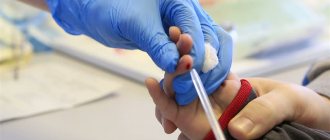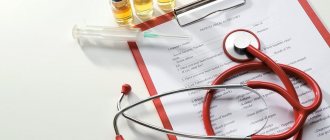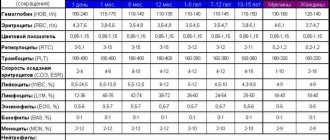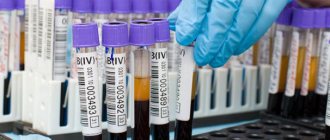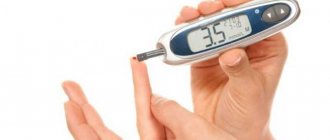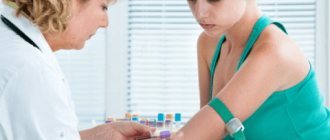On an empty stomach or not? Instructions on how to take blood tests correctly
Every time a doctor prescribes blood tests, the question arises of how to properly prepare for the procedure in order to get the most accurate result.
The head of the clinical diagnostic laboratory, Candidate of Medical Sciences Olga Anatolyevna Litinskaya spoke about the most basic rules of preparation.
1. Most tests are done on an empty stomach. This means that 6-8 hours should pass between the last meal and the procedure. These tests include all biochemical indicators, some hormones, serological tests (HIV, hepatitis, syphilis), coagulogram. Before donating blood, at least 10-12 hours must pass for lipid spectrum indicators (cholesterol, triglycerides). Before taking a general blood test, you can indulge in a light breakfast. But after it, blood can be donated no earlier than 2-3 hours later. Juice, tea and coffee, especially with sugar, are also prohibited. But you can drink some water in the morning and brush your teeth. Dinner the day before should be light, without fatty foods, as this can lead to “turbidity” of the blood serum and complicate diagnosis. 2. Many hormones are subject to daily fluctuations, so they must be taken strictly before 12.00. These are thyroid hormones, parathyroid hormone, ACTH, cortisol and some others. 3. The test result may be affected by stress or physical activity (running, climbing stairs). It is advisable to rest for 10-15 minutes before the procedure and calm down. 4. Before donating blood, it is not recommended to take any medications, except in cases where it is necessary to determine the concentration of a substance in the blood. 5. Do not smoke an hour before the test, especially important for donating blood for glucose. 6. You cannot donate blood after an X-ray examination, CT and MRI, or physiotherapeutic procedures. 7. Special requirements for women of reproductive age (before menopause). Hormones such as FSH, LH, prolactin, estriol, estradiol, progesterone are released on certain days of the menstrual cycle. Be sure to follow your doctor's advice. 8. But PCR, genetic and autoimmune tests, allergy tests do not require special preparation. They can be taken at any time of the day. And one more important clarification. Different laboratories may use different methods for working with blood, and even the units of measurement may differ. It is correct to compare only those results that were performed in the same laboratory and at the same time of day. This is necessary for those who regularly donate blood for the same tests. The clinical diagnostic laboratory of the Federal State Budgetary Institution "NMITs TPM" of the Ministry of Health of Russia offers a wide range of laboratory services. We have modern equipment, qualified personnel, extensive experience and federal quality control at our disposal.
Most analyzes are completed in one business day.
Preparing for research
RULES FOR PREPARATION FOR BLOOD STUDIES.
General rules for preparing for a blood test.
1. The blood test must be taken in the morning - from 8 to 11 o'clock. Since hormonal and biochemical parameters are subject to daily fluctuations, and reference values are the average statistical data obtained when blood was taken in the morning.
2. Blood is donated on an empty stomach. In the evening, on the eve of a blood test, it is undesirable to eat heavy, fried and fatty foods. Between dinner and blood sampling, at least 8, but no more than 14 hours should pass. During this period of time, you can only drink still water. Such preparation for a blood test is due to the fact that food, being absorbed into the intestines, has not only a direct effect on the reliability of the result, but also an indirect one - the level of hormones changes, and the sample becomes turbid due to the increased amount of fat particles. For tests for infections and emergency studies, it is acceptable to donate blood 4-6 hours after the last meal.
3. Blood for research must be donated before starting to take medications or no earlier than 10–14 days after stopping them. If you are taking medications, be sure to notify your doctor. If it is necessary to donate blood to assess the effectiveness of the treatment, this should be done no earlier than 7-14 days after the last dose of the drug.
4. When preparing for a blood test, it is strictly forbidden to drink alcohol the day before the test. Since alcohol affects the metabolic processes in the body, which may affect the reliability of the analysis results.
5. Do not smoke for an hour before blood sampling, because smoking affects the secretion of biologically active substances.
6. Preparing for a blood test involves abstaining from strong emotional and physical stress in order to avoid biochemical and hormonal changes and, as a result, distortion of the test result.
7. It is not advisable to donate blood after an instrumental examination, physiotherapeutic or other medical procedures. Since they can cause changes in some laboratory parameters.
8. If it is necessary to take a blood test several times in a row in order to monitor laboratory parameters over time, then in order to obtain true results, all tests must be taken at the same time of day, in the same laboratory, with the same preparation for the blood test.
9. Before taking blood, it is recommended to calm down and relax, for example, sit in the Clinic lobby for 10-15 minutes.
10. If you feel dizzy or weak, warn the treatment nurse about this - your blood will be taken in a lying position.
Preparation for a biochemical blood test.
Preparing for a biochemical blood test involves more stringent restrictions on diet and daily routine than those set out above in the basic rules.
Let's consider how to properly prepare for a biochemical blood test, depending on what indicators will be examined.
1. Urea. 1-2 days before blood sampling, you must stop eating kidneys and liver, limit fish, meat, tea, and coffee in your diet. Intense physical activity the day before is contraindicated.
2. Lipoproteins, cholesterol. You need to donate blood for these indicators 12-14 hours after your last meal. If there is no need to determine the lipid-lowering effect of drug therapy, then two weeks before the blood test, drugs that lower lipid levels should be discontinued.
3. Glucose. Before taking blood, it is forbidden not only to eat and drink drinks (except water, of course), but even to chew gum and brush your teeth. Diuretics, contraceptives and other medications also affect the glucose value.
4. Glucose tolerance test (GTT). It is carried out only if there are preliminary results of fasting blood glucose levels.
To prepare for a blood test, you must adhere to your usual diet and normal daily physical activity for 3 days. The study is carried out in the morning on an empty stomach after an overnight fast for 12-16 hours (during this time you should not smoke or drink alcohol).
During the study, the patient should lie or sit quietly, not smoke, not be overcooled, and not engage in physical activity. It is not recommended to conduct research after and during stress, after operations and childbirth, during inflammatory processes, alcoholic cirrhosis of the liver, hepatitis, during menstruation, and in gastrointestinal diseases with impaired glucose absorption.
Before the test, it is necessary to exclude medical procedures and medications (adrenaline, glucocorticoids, contraceptives, caffeine, thiazide diuretics, psychotropic drugs and antidepressants). Discontinuation of medications is carried out only after preliminary consultation of the patient with a doctor.
A glucose tolerance test is not performed for CHILDREN UNDER 14 YEARS OLD.
PREGNANT women are recommended to carry out a glucose tolerance test at 24-28 weeks, this allows identifying women with gestational diabetes with an accuracy of 98%.
5. Haptoglobin. Before studying this indicator, it is necessary to exclude taking the following medications: methyldopa, dapsone, estrogens, sulfasalazine, androgens, tamoxifen, oral contraceptives.
6. Alpha-2-macroglobulin. 3 days before blood sampling, you should stop eating meat.
Preparing for a blood test for hormones.
To obtain accurate results of a blood test for hormones, the general rules for preparing for blood sampling must be supplemented. Depending on which hormone is being tested, different preparations for the blood test are required.
1. Thyroid hormones. It is necessary to stop taking medications that affect the functioning of the thyroid gland 2-4 weeks before the test. If the study is carried out in order to monitor the effectiveness of treatment, then it is necessary to exclude taking medications only on the day of the analysis (this must be noted in the referral for analysis).
2. Anti-Mullerian hormone (AMH/MIS). Blood sampling for this hormone is carried out on days 3-5 of the menstrual cycle. A few days before the study, it is necessary to avoid intense physical activity. The analysis cannot be performed during acute illnesses.
3. Norepinephrine and adrenaline. 8 days before blood sampling, you must stop taking alpha blockers and sacylates. The day before the test, avoid drinking alcohol, tea, coffee, bananas and B vitamins.
4. Angiotensin. Preparation for a blood test for this hormone must begin in advance. If estrogen is prescribed, then they should be excluded 1-2 months before the study. Take diuretics - 3 weeks, take antihypertensive drugs - 1 week before blood sampling.
5. ACTH and cortisol are stress hormones, so before the test you need to sit in a calm and relaxed state for 20 minutes. The collection of material for analysis takes up to 9 hours, since the level of these hormones changes throughout the day.
6. Sex hormones. Women of reproductive age are tested for this type of hormones strictly on the days of the menstrual cycle. This is the preparation for a blood test for sex hormones. In the direction for analysis, it is necessary to indicate the phase of the cycle. When to take sex hormones:
- LH, FSH are given on days 3-5 of the cycle;
- 17-OH-progesterone, DHA - sulfate, testosterone - 7-9 days of the cycle;
- estradiol - 5-7 or 21-23 days of the cycle;
- progesterone - 21-23 days of the cycle.
Before testing for the hormone prolactin, it is necessary to exclude palpation of the mammary glands.
Preparing for a blood test for tumor markers.
To obtain accurate results of a blood test for tumor markers, it is necessary to strictly follow the general rules for preparing for blood collection.
It is necessary to add that when testing for prostate-specific antigen (PSA), it is necessary to abstain from sexual intercourse for a week and not have any impact on the prostate gland - cycling, massage, transrectal ultrasound, digital examination of the prostate gland;
Important differences
Not everyone understands how a general blood test differs from a detailed study. In the latter case, about 30 important blood parameters are additionally examined, which provide the necessary data on the state of the body. A detailed general blood test allows you to examine the following key indicators:
- Platelet count.
- Blood color index.
- Hemoglobin.
- Leukocyte blood count, etc.
To conduct this study, blood is drawn from a vein, and the patient’s preparation is standard - blood should be donated on an empty stomach. A detailed analysis displays more blood parameters, and therefore, its results often reveal several diseases at once. Therefore, doctors advise undergoing this preventive examination several times a year without the need to diagnose the disease.
Do I need to take a clinical blood test and a general urine test before vaccinations?
In addition to medical examination and acute illness, the third reason for taking a clinical blood test and a general urine test is the upcoming vaccination. If you or your child last had blood and urine tests a year ago and everything was fine, this is not a reason to refuse them.
Vaccination is a rather serious intervention in the body, requiring 100% confidence that the patient is healthy. This is why I always recommend that my patients preparing for vaccinations take a clinical blood test and a general urine test at least 30 days before vaccination, but the closer, of course, the better.
Urogenital urethral smear in men
- For 2 weeks before the study, exclude the local use of antiseptics and/or antibacterial and antifungal drugs.
- For 3 hours before the examination, refrain from urinating and do not toilet the external genitalia.
- It is recommended to analyze a urogenital smear in a man no earlier than 2 weeks after taking antibacterial drugs.
- In men with urethral discharge, the surface of the glans and the external urethral meatus should be cleaned with a gauze pad and the foreskin pulled back to prevent contamination.
1. General blood test.
Before taking a general blood test, the last meal should be no earlier than 3 hours before the blood draw.
2. Biochemical blood test.
To determine cholesterol and lipoproteins blood is taken after a 12-14 hour fast. Two weeks before the study, it is necessary to discontinue drugs that lower blood lipid levels, unless the goal is to determine the lipid-lowering effect of these drugs.
To determine the level of uric acid in the days preceding the study, it is necessary to follow a diet: avoid eating foods rich in purines - liver, kidneys, limit meat, fish, coffee, tea as much as possible in the diet. Intense physical activity is contraindicated.
Blood donation for hormonal testing is carried out on an empty stomach (preferably in the morning; if this is not possible, 4-5 hours after the last meal in the afternoon and evening). On the eve of the test, high-fat foods should be excluded from the diet, and the last meal should not be large.
The results of hormonal studies in women of reproductive age are influenced by physiological factors associated with the stage of the menstrual cycle, therefore, when preparing for an examination for sex hormones, you should indicate the phase of the cycle and adhere to the recommendations of your doctor about the day of the menstrual cycle on which you need to donate blood.
Hormones of the reproductive system in women are tested strictly according to the days of the cycle:
- LH, FSH - 3-5 days;
- Estradiol - 5-7 or 21-23 days of the cycle;
- progesterone 21-23 days of the cycle.
- prolactin, 17-OH-progesterone,
- DHA sulfate, testosterone - 7-9 days.
- Blood for insulin and C-peptide is given strictly on an empty stomach in the morning. Thyroid hormones, insulin, C-peptide are given regardless of the day of the cycle.
In men, reproductive hormones are released in the morning (8-9 am).
Before donating blood for stress hormones (ACTH, cortisol) , you need to calm down, when donating blood, get distracted and relax, since any stress causes an unmotivated release of these hormones into the blood, which will lead to an increase in this indicator.
The requirements for donating blood when testing for infections are the same as when studying a hormonal profile. Blood is donated on an empty stomach (in the morning or 4-5 hours after the last meal in the afternoon and evening, and this last meal should not be heavy, and high-fat foods should be excluded from the diet the day before the test). The results of tests for the presence of infections depend on the period of infection and the state of the immune system, so a negative result does not completely rule out infection. In doubtful cases, it is advisable to re-test after 3-5 days.
A blood test for the presence of antibodies of the IgG, IgM, IgA classes to infectious agents should be carried out no earlier than 10-14 days from the moment of illness, since the production of antibodies by the immune system and the appearance of their diagnostic titer begins during this period. At an early stage of the disease, seroconversion occurs (absence of antibodies during the acute period of the disease).
Before donating blood for viral hepatitis , 2 days before the test, it is advisable to exclude citrus fruits, orange fruits and vegetables from the diet.
Before donating blood for coagulation studies, you must inform your doctor about taking anticoagulant medications.
Microbiological and PCR studies
- The study is recommended to be carried out before starting antibiotics and other antibacterial chemotherapy drugs (if this is not possible, then no earlier than 12 hours after discontinuation of the drug).
- Avoid taking laxatives, administering rectal suppositories, oils, limit taking medications that affect intestinal motility (belladonna, pilocarpine, etc.) and drugs that affect the color of stool (iron, bismuth, barium sulfate) for 72 hours before stool collection .
- The material obtained after an enema, after taking radiopaque substances (barium during X-ray examination) is unsuitable for research.
Medical Center MiR
It would seem, how can a small piece of bread, a sip of coffee or a morning smoke break affect the test results? Let's figure this out.
Why is a blood test taken on an empty stomach?
According to the rules, most blood tests are taken exclusively on an empty stomach in the morning. Since it is at this time that the body “gives out” the correct composition of blood, urine, etc. Eating leads to a distortion of the blood composition, which greatly affects test results. Both after a hearty breakfast and after a minimal meal, the biochemical composition of the blood changes - the concentration of glucose, cholesterol, hemoglobin, leukocytes, some hormones, and metabolic products. Therefore, the results may be inaccurate, and you will have to retake the biomaterial. If you provide a doctor with test results taken after eating, there is a high probability of making an erroneous diagnosis, detecting non-existent diseases, and prescribing the wrong treatment. In order for the diagnosis to be accurate, the blood should not contain excess sugar, fats and microelements. It is especially not recommended to consume fatty and fried foods the day before, since in this case chylosis (fat in the blood serum) is likely, which leads to an increase in cholesterol levels and a distortion of biochemistry. If you eat fish or seafood, your results may show increased protein levels. Meat products contribute to blood thickening. Sweet foods increase glucose levels.
Why can you only drink water before a blood test?
Before taking blood tests, it is recommended to drink only clean, boiled water in small quantities, as it thins the blood and makes it easier to take samples from a vein. Mineral water and sweet soda are not allowed, because... they, like food, affect the composition of the blood, that is, the result of the study. The list of exclusions also includes coffee and tea, since these drinks contain a large amount of microelements and can also change the composition of the blood and its elements. Their use must be avoided at least 6 hours in advance. Alcohol also has a negative impact on research results. Alcoholic drinks trigger a whole complex of biochemical reactions in the blood, therefore, if there was a feast the day before, it is advisable to postpone the study for 1-2 days.
Why can't you smoke?
A few hours before the test, you need to stop smoking. This requirement is as important as refusing food, and should not be neglected, even if you “really want to.” Nicotine contained in tobacco smoke has a complex effect on the general condition of the body, promotes vasoconstriction and impaired blood flow, increases blood viscosity, saturates its composition with various chemical compounds and affects hormonal levels.
Why is it necessary to eliminate physical activity and stress?
It’s hard to believe, but hard physical work, emotional stress, and stress also affect blood counts. Physical activity increases the number of leukocytes, red blood cells, and hemoglobin, and stressful conditions increase the level of platelets and glucose and affect the production of insulin.
To avoid having to come back for a blood draw, we recommend following these rules in advance. Compliance with the preparation rules is a guarantee of the accuracy of the results, the reliability of the diagnosis and further therapy!
